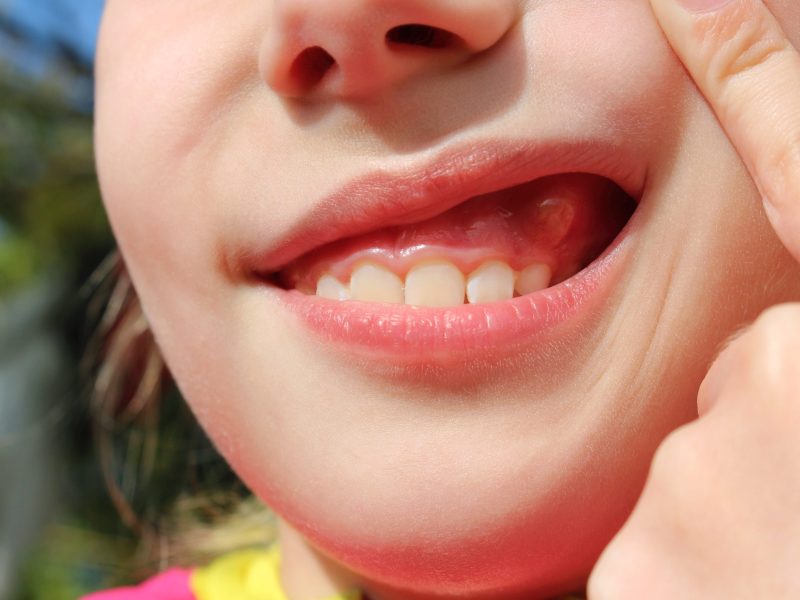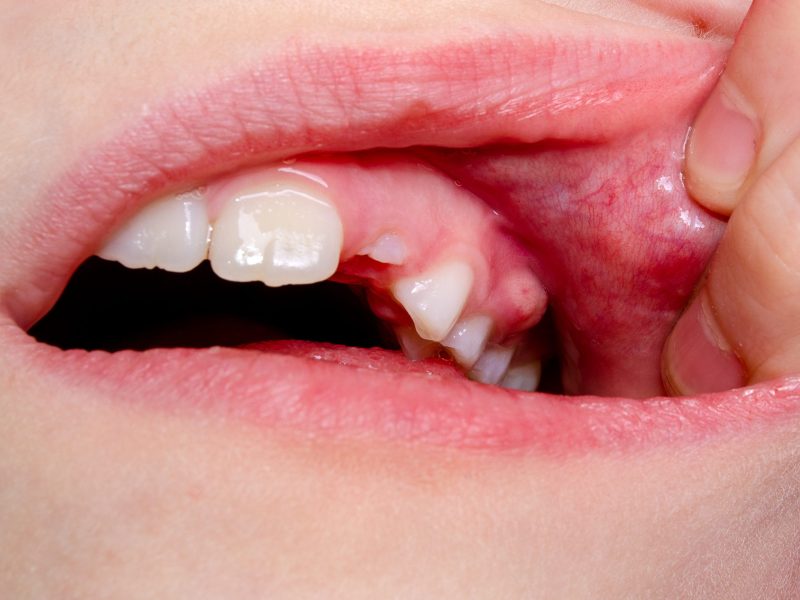What is a Dental Abscess?
A dental abscess is a painful condition that happens when a pocket of pus forms in parts of the tooth or gums. It’s caused by a bacterial infection and can lead to serious discomfort and swelling. If you notice a sudden, severe pain in your mouth, it could be an abscess.

Types of Dental Abscesses
There are mainly two types of dental abscesses:
Periapical Abscess
This type occurs at the tip of the tooth’s root. It usually happens when bacteria invade the dental pulp — the innermost part of the tooth that contains blood vessels, nerves, and connective tissue.
Periodontal Abscess
This one forms in the gums at the side of a tooth root. It generally occurs when the infection spreads from the gum pockets to nearby tissues. This might happen due to gum disease, which causes the gums to pull away from the teeth, leaving deep pockets that hold bacteria.
Each type of abscess can cause significant pain and needs treatment to resolve, as they won’t go away on their own. Recognising these signs early and seeking professional help from your Brisbane dentist can save you from further pain and prevent serious complications.
Signs You Might Have a Dental Abscess
If you’re worried you might have a dental abscess, here are some clear signs to watch for. Each symptom can help you recognise the need to see a dentist quickly:
- Persistent, Throbbing Pain: This is the most noticeable sign. The pain usually starts suddenly and gets worse over time. It can spread to your jaw, neck, or ear.
- Sensitivity to Temperature: You might feel sharp pain when eating or drinking hot or cold foods and liquids.
- Pain When Chewing: Eating or biting can cause intense discomfort if there’s an abscess near your tooth.
- Swelling: You might see or feel swelling around your face, jaw, or neck. The gums around the tooth can also swell and look red.
- Fever: An abscess might raise your body temperature as your immune system fights the infection.
- Bad Taste and Smell: A foul taste or a bad smell from your mouth is common, especially if pus is draining from the abscess.
- General Unwell Feeling: Feeling unwell, tired, or generally under the weather can accompany the other symptoms, especially if the infection is severe.
If you notice any of these symptoms, it’s important not to ignore them. Getting early treatment can prevent more serious problems and relieve your pain.
Causes of a Dental Abscess
Understanding what leads to a dental abscess can help you take steps to prevent one. Here’s a straightforward breakdown of the main causes:
- Poor Dental Hygiene: Not brushing and flossing regularly allows bacteria to build up on your teeth and gums. This buildup can lead to decay and gum disease, both of which can cause an abscess.
- Dental Decay: If cavities are not treated, the decay can progress deep into the tooth and reach the dental pulp, creating a perfect environment for an abscess to start.
- Gum Disease: Severe gum disease (periodontitis) damages the gums and the bone that supports the teeth. This can create pockets between the teeth and gums where bacteria can gather, and abscesses can form.
- Trauma to the Tooth: An injury to the mouth can damage a tooth, leading to infection if not promptly or properly treated. Even if the trauma is old and the tooth has had previous work, an abscess can still develop.
- Previous Dental Work: Sometimes, dental work like fillings or crowns can fail over time, allowing bacteria to enter and infect the centre of the tooth.
- Diet: A diet high in sugar and carbohydrates can contribute to dental decay and the formation of abscesses, as these foods feed the bacteria in your mouth.
Why You Shouldn’t Ignore a Dental Abscess
Ignoring a dental abscess is risky. Without treatment, the infection can worsen and lead to serious complications. Here are the key risks associated with untreated dental abscesses:
- Spread of Infection: The infection can spread to the jaw, other teeth, and even to distant parts of the body, like your neck, sinuses, or brain. This can lead to severe health problems that are much harder to treat.
- Loss of the Affected Tooth: As the abscess progresses, it can destroy the surrounding bone and tissue, potentially leading to tooth loss.
- Sepsis: In severe cases, the infection can enter your bloodstream, leading to sepsis, a life-threatening response to infection that requires immediate medical attention.
- Increased Pain and Discomfort: Without treatment, the pain typically worsens. Over time, it can become unbearable and disrupt your daily activities, sleep, and ability to eat.
- Facial Swelling: Significant swelling can occur, which, in some cases, can obstruct the airway or spread to the eye area, creating an emergency situation.
- General Health Deterioration: An ongoing infection can weaken your immune system and affect your overall health, especially if you have pre-existing conditions.
Taking action early by seeing a dentist can prevent these complications, relieve your pain, and ensure your mouth stays healthy. If you suspect you have a dental abscess, don’t wait. Seek professional dental care immediately.

First Aid for Dental Abscesses
If you suspect you have a dental abscess, taking the right steps before you can see a dentist can help manage the pain and prevent the infection from worsening. Here’s what you can do:
- Rinse with Saltwater: Mix 1/2 teaspoon of salt into a cup of warm water and gently rinse your mouth. This can help clean the area around the abscess and draw out some of the pus, reducing pain.
- Avoid Certain Foods: Eat soft foods and avoid hot beverages. Keep away from anything too cold, hard, or sugary, as they can aggravate the pain.
- Keep Your Head Elevated: When lying down, keep your head higher than the rest of your body. This can help reduce swelling and pain.
- Do Not Poke at the Abscess: Avoid touching or pressing on the abscess. Trying to drain it yourself can spread the infection.
- Pain Relief: You can take over-the-counter pain relievers such as ibuprofen or paracetamol to help manage the pain. Always follow the dosage instructions on the package.
- Stay Hydrated: Drink plenty of fluids to help your body fight the infection and stay hydrated.
- Do Not Smoke: Smoking can further irritate the abscessed area and delay healing.
- See a Dentist Promptly: Arrange to see a dentist as soon as possible. An abscess won’t get better on its own and requires professional treatment.
These steps are not a cure but can provide relief until you can receive professional dental care. Remember, a dental abscess is a serious condition, so it’s important to see a dentist quickly.
Professional Treatments for Dental Abscesses
When you see a dentist for a dental abscess, they will focus on clearing the infection and preserving your tooth and gum health. Here are the typical treatments used to manage dental abscesses:
- Draining the Abscess: The first step is usually to drain the abscess to eliminate the infection. The dentist makes a small cut into the abscess, allowing the pus to drain out, which relieves pressure and pain.
- Root Canal Treatment: If the abscess is due to an infection in the tooth’s pulp, a root canal might be necessary. The dentist removes the infected pulp, cleans the root canals, and seals the space to prevent further infection.
- Antibiotics: If the infection has spread beyond the abscess area or if you have a weakened immune system, your dentist might prescribe antibiotics to help clear the infection.
- Extraction of the Tooth: In cases where the tooth is too damaged to save, the dentist might recommend removing it. This removal helps prevent the spread of infection.
- Incision and Drainage: If the abscess is in the gums, the dentist may perform a procedure called incision and drainage. They make a small cut in the gum tissue to drain the abscess.
- Follow-Up Care: After treating an abscess, follow-up appointments are crucial to ensure the infection is gone and to discuss further treatment options if necessary, such as dental implants or bridges to replace a removed tooth.
These treatments aim to alleviate pain and remove the infection to restore oral health efficiently and safely. If you suspect you have a dental abscess, it’s essential to see a dentist quickly to prevent more severe complications.
Preventing Dental Abscesses
Keeping your teeth and gums healthy is the best way to prevent dental abscesses. Here are straightforward, effective steps you can take to reduce your risk:
- Brush Regularly: Brush your teeth at least twice a day with fluoride toothpaste. Spend about two minutes each time to clean all surfaces thoroughly.
- Floss Daily: Flossing once a day helps remove food particles and plaque from between the teeth and under the gumline, areas your toothbrush can’t reach.
- Use Mouthwash: An antibacterial mouthwash can reduce bacteria that cause decay and gum disease. Rinse once a day.
- Eat Healthily: Reduce your intake of sugary foods and drinks as they can contribute to tooth decay. Eat plenty of fruits, vegetables, and whole grains.
- Avoid Smoking: Smoking increases your risk of gum disease, which can lead to abscesses. Quitting smoking helps keep your gums healthy.
- Regular Dental Check-Ups: Visit your dentist regularly for cleanings and check-ups. They can spot early signs of problems and prevent them from becoming serious.
- Treat Dental Problems Early: If you have tooth decay or damaged teeth, get them treated promptly to prevent infection.
- Protect Your Teeth: If you play sports, wear a mouthguard to protect your teeth from injury, which can lead to abscesses.
Frequently Asked Questions
Can a dental abscess go away on its own?
No, a dental abscess will not go away on its own. It requires treatment from a dentist to clear the infection and prevent complications.
What happens if a dental abscess bursts?
If an abscess bursts, it may temporarily relieve pain due to pressure reduction, but it still requires dental treatment. The burst can spread the infection to other parts of your mouth and beyond.
Can children get dental abscesses?
Yes, children can get dental abscesses, especially if their dental hygiene is not maintained. It’s crucial for children to have regular dental check-ups.
Is a dental abscess an emergency?
Yes, a dental abscess is considered an emergency. If you suspect an abscess, see a dentist immediately to avoid worsening the infection.
Can a dental abscess recur?
Yes, if the underlying conditions are not addressed, such as ongoing gum disease or untreated dental decay, an abscess can recur.
What should I do if I think I have a dental abscess?
Contact a dentist as soon as possible. In the meantime, rinse your mouth with salt water to help manage pain and keep the area clean.
How quickly should I seek treatment for a suspected abscess?
Seek treatment as soon as you suspect an abscess. Prompt treatment is crucial to prevent further infection and pain.
Are there foods or drinks I should avoid with a dental abscess?
Avoid very hot or cold foods and drinks, as they can increase pain. Also, steer clear of sugary and acidic foods and drinks, which can aggravate the infection.